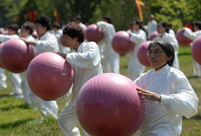 Amphibious armored vehicle unit conducts open sea drill
Amphibious armored vehicle unit conducts open sea drill
 Water relay in Henan
Water relay in Henan
 Ethnic culture feasts eyes of travelers
Ethnic culture feasts eyes of travelers
 80 security dogs assembled in Nanjing police dog training base
80 security dogs assembled in Nanjing police dog training base
 Graffiti artists paint on street walls in Xinjiang
Graffiti artists paint on street walls in Xinjiang
 Story of ceramic artist Zhang Lingyun
Story of ceramic artist Zhang Lingyun
 Magic summer night dream in Hongyuan
Magic summer night dream in Hongyuan
 Incredible creatures in headwaters drainage region of Lancang River
Incredible creatures in headwaters drainage region of Lancang River
 The future of rock n' roll seen in young rockers in China
The future of rock n' roll seen in young rockers in China
 Magnificent Yanziya Cliff
Magnificent Yanziya Cliff
The official said many domestic automakers are under scrutiny, but the problem here is not as obvious as that involving their international peers, partly due to their small market share.
Domestic-brand automakers accounted for less than 20 percent of China's auto sales in the first half of this year, the China Association of Automobile Manufacturers says.
The official said, "Our goal (with antitrust probes) is to ensure that Chinese consumers can enjoy high-quality auto and component services with prices as fair as in other markets."
He said the Chinese government aims to establish an environment in which enterprises can compete on an equal footing.
Jessica Su, antitrust scholar and Institute of American Studies associate professor at the Chinese Academy of Social Sciences, said the commission has strong evidence and a legal base to continue its investigations.
In the new-car and after-sales markets, the conduct of international automakers may have infringed the antitrust law, including price-fixing, territorial restrictions and customer restrictions , Su said.
In the after-sales car market, suspected conduct includes exclusive supply, exclusive purchase and excessive pricing of replacement parts, as well as restrictions on the supply of technical information needed for repair and maintenance, she said.
"Such behavior mainly comes from car manufacturers suspected of substantially impeding competition and harming consumer welfare," Su said.
"If similar conduct occurred in the United States, European Union, Japan, South Korea and other mature market economies, it would doubtless trigger antitrust investigations," she said.
The Anti Monopoly Law allows enterprises to claim efficiencies and other reasons to justify otherwise unlawful conduct, added Su.
Robin Bew, managing director of the Economist Intelligence Unit, said antitrust in China is a big issue that requires fairness and transparency.
"Big Western businesses are looking at what is happening in China and questioning whether the law is being applied evenly. That is always a worry for companies," Bew said.
"The areas where China needs foreign investment to bring in new know-how are sectors like education, healthcare and services," he added.
But Bew thinks that China will remain attractive for foreign investors.
"The China market is so big and it will be very difficult for any company to say that it won't be here in China. Most companies are now profitable in China and it is an important part of their revenue story worldwide, so they won't leave."
 |
 Beijing policewomen posters become a hit
Beijing policewomen posters become a hit Armored regiment trains on the sea
Armored regiment trains on the sea Children spend 'Father's Day' with dads at work
Children spend 'Father's Day' with dads at work 'Pan Da' appear in Shanghai World Financial Center
'Pan Da' appear in Shanghai World Financial Center Champions take selfies on podium
Champions take selfies on podium National Fitness Day celebrated around China
National Fitness Day celebrated around China Traditional culture colors summer vacation
Traditional culture colors summer vacation Young athletes fighting for their dreams
Young athletes fighting for their dreams 68 meters high thermometer in Shanxi, called ‘fighter’ of thermometers
68 meters high thermometer in Shanxi, called ‘fighter’ of thermometers The vanishing folk skills
The vanishing folk skills Intoxicating beauty of Dali, Yunnan province
Intoxicating beauty of Dali, Yunnan province Memorable moments of Ludian earthquake
Memorable moments of Ludian earthquake Bring world together to help elephant
Bring world together to help elephant 'Building Dreams'
'Building Dreams'  Labrang Monastery
Labrang MonasteryDay|Week|Month